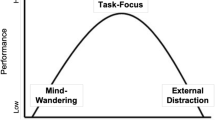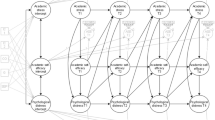Abstract
The present investigation employed a general measure of self-efficacy, a measure of perceived control, and items relating to expectation and evaluation (pre and post). The purpose was to determine whether general self-efficacy or perceived control best predicted the criterion variables of state anxiety and performance on a stressful cognitive task (solving anagrams) under conditions of high versus low control. These relationships were tested under the experimental conditions of high and low objective control (i.e., the actual control afforded by the situation). Results showed that general self-efficacy, relative to perceived control was a better predictor of state anxiety in the high and low control conditions but neither predicted actual performance. Participants’ expectations of task difficulty, their own performance, and their performance relative to the performance of others taken before the task were compared with their evaluations of difficulty and performance after completing the task. Participants indicated that the task was easier than anticipated, but rated their own performance more poorly after completion of the task.
Similar content being viewed by others
References
Ajzen, I. & Madden, T.J. (1986). Prediction of goal-directed behaviour: Attitudes, intentions, and perceived behavioural control. Journal of Experimental Social Psychology, 22, 453–474.
Averill, J.R. (1973). Personal control over aversive stimuli and its relationship to stress. Psychological Bulletin, 80, 286–303.
Bandura, A. (1983). Self-efficacy determinants of fears and calamities. Journal of Personality and Social Psychology, 45, 464–469.
Bandura, A. (1986). Social foundations of thought and action. Englewood Cliffs, NJ: Prentice-Hall.
Bandura, A. (1988). Self-efficacy conception of anxiety. Anxiety Research, 1, 77–98.
Bandura, A. (1997). Self-efficacy: the exercise of control. New York: W.H. Freeman.
Blankstein, K.R. (1984). Psychophysiology and perceived locus of control: Critical review, theoretical speculation and research directions. In H.M. Lefcourt (Ed.), Research with the locus of control construct. Vol. 3. pp. 73–95. Orlando: Academic Press.
Blankstein, K.R., Toner, B.B. & Flett, G.L. (1989). Test anxiety and the contents of consciousness: Thought-listing and endorsement measures. Journal of Research in Personality, 23, 269–286.
Bourne, L. E., Jr., Edstrand, B. R. & Dominowski, R. I., (1971). The psychology of thinking. Englewood Cliffs, NJ: Prentice-Hall.
Carver, C. S. & Scheier, M. F. (1986). Self and the control of behavior. In L. M. Hartman & K. R. Blankstein (Eds.), Advances in the study of communication and affect: Vol ll. Perception of self in emotional disorder and psychotherapy (pp. 5–35). New York: Plenum Press.
Chwalisz, K., Altmaier, E.M. & Russell, D.W. (1992). Causal attributions, self-efficacy cognitions, and coping with stress. Journal of Social and Clinical Psychology, 11, 377–400.
Conway, V. J. & Terry, D. J. (1992). Appraised controllability as a moderator of the effectiveness of different coping strategies: A test of the goodness of fit hypothesis. Australian Journal of Psychology, 44, 1–7.
Cozzarelli, C. (1993). Personality and self-efficacy as predictors of coping with abortion. Journal of Personality and Social Psychology, 65, 1224–1236.
Endler, N.S., Speer, R.L., Johnson, J.M. & Flett, G.L. (2000). Controllability, Coping, efficacy, and distress. European Journal of Personality, 14, 245–264.
Endler, N.S., Edwards, J.M. & Vitelli, R. (1991). Endler Multidimensional Anxiety Scales (EMAS): Manual. Los Angeles, CA: Western Psychological Services.
Folkman, S. (1984). Personal control and the stress and coping process: a theoretical analysis. Journal of Personality and Social Psychology, 46, 839–852.
Geer, J. & Maisel., E. (1972). Evaluating the effects of the prediction-control confound. Journal of Personality and Social Psychology, 23, 314–319.
Gerin, W., Litt, M., Deich, J. & Pickering, T.G. (1995). Self-efficacy as a moderator of perceived control effects on cardiovascular reactivity: Is enhanced control always beneficial? Psychosomatic Medicine, 57, 390–397.
Glass, D.C., Singer, J.E., Leonard, H.S., Krantz, D., Cohen, S. & Cummings, H. (1973). Perceived control of aversive stimulation and the reductions of stress responses. Journal of Personality, 41, 517–595.
Jimmieson, N. L. & Terry, D. J. (1997). Responses to an in-basket activity: The role of work stress, behavioral control, and informational control. Journal of Occupational Health Psychology, 2, 1–12.
Litt, M.D. (1988). Self-efficacy and perceived control: Cognitive mediators of pain tolerance. Journal of Personality and Social Psychology, 54, 149–160.
Maddux, J.E. (1991). Self-efficacy. In C.R. Snyder. & D.R. Forsyth. Handbook of Social and Clinical Psychology (pp. 57–78). New York: Pergamon Press.
Mallinckrodt, B. (1992). Childhood emotional bonds with parents, development of adult social competencies and availability of social support. Journal of Counseling Psychology, 39, 453–461.
Manstead, A. S. R. & van Eekelen, S. A. M. (1998). Distinguishing between perceived behavioral control and self-efficacy in the domain of academic intentions and behaviors. Journal of Applied Social Psychology, 28, 1375–1392.
Meier, S., McCarthy, P. R. & Schmeck, R. R. (1984). Validity of self-efficacy as a predictor of writing performance. Cognitive Therapy and Research, 8, 107–120.
Mendelsohn, G. A., Griswold, B. B. & Anderson, M. L. (1966). Individual differences in anagram-solving ability. Psychological Reports, 2, 429–439.
Mikulincer, M. (1989) Cognitive interference and learned helplessness: The effects of off-task cognitions on performance following unsolvable problems. Journal of Personality and Social Psychology, 57, 129–135.
Mineka, S. & Henderson, R.W. (1985). Controllability and predictability in acquired motivation. Annual Review of Psychology, 36, 495–529.
Morgan, C.H., Owen, D.W., Miller, A. & Watts, M.L. (1986). Variations in stress responses as a function of cognitive and personality variables. Psychological Reports, 59, 575–583.
Notani, A. S. (1998). Moderators of perceived behavioral control’s predictiveness in the theory of planned behavior: A meta-analysis. Journal of Consumer Psychology, 7, 247–271.
O'Leary, A. (1985). Self-efficacy and health. Behaviour Research and Therapy, 23, 437–451.
Pintrich, P. R. & DeGroot, E. V. (1990). Motivational and self-regulated learning components of classroom academic performance. Journal of Educational Psychology, 82, 33–40.
Rich, A. R. & Woolever, D. K. (1988). Expectancy and self-focused attention: Experimental support for the self-regulation model of test anxiety. Journal of Social and Clinical Psychology, 7, 246–259.
Rotter, J. (1966). Generalized expectancies for internal versus external control of reinforcement. Psychological Monographs, 80, 609.
Sherer, M., Maddux, J., Mercandante, B., Prentice-Dunn, S., Jacobs, B. & Rogers, R. (1982). The selfefficacy scale: Construction and validation. Psychological Reports, 51, 663–611.
Smith, R.E. (1989). Effects of coping skills training on generalized self-efficacy and locus of control. Journal of Personality and Social Psychology, 56, 228–233.
Smith, R. J., Arnkoff, D. B. & Wright, T. L. (1990). Test anxiety and academic competence: A comparison of alternative models. Journal of Counseling Psychology, 37, 313–321.
Stanley, K. D. & Murphy, M.R. (1997). A comparison of general self-efficacy with self-esteem. Genetic, Social, and General Psychology Monographs, 123, 79–99.
Terry, D.J. & O'Leary, J.E. (1995). The theory of planned behavior: The effects of perceived behavioral control and self-efficacy. British Journal of Social Psychology, 34, 199–220.
Thompson, S.C. (1991). Intervening to enhance perceptions of control. In Snyder, C.R., & Forsyth, D.R. Handbook of Social and Clinical Psychology (pp. 89–101). New York: Pergamon Press.
Tresselt, M. E. & Mayzner, M. S. (1966). Normative solution times for a sample of 134 solution words and 378 associated anagrams. Psychonomic Monograph Supplements, 1, 293–298.
Woodruff, S. L. & Cashman, J. F. (1993). Task, domain, and general efficacy: A re-examination of the Self-Efficacy Scale. Psychological Reports, 72, 423–432.
Wortman, C.B., Panciera, L., Shusterman, L. & Hibscher, J. (1976). Attributions of causality and reactions to uncontrollable outcomes. Journal of Experimental Social Psychology, 12, 301–316.
Author information
Authors and Affiliations
Additional information
The study reported in this article was supported, in part, by Social Sciences and Humanities Research Council Grant No. 410-94-1473 to Norman S. Endler.
Rights and permissions
About this article
Cite this article
Endler, N.S., Speer, R.L., Johnson, J.M. et al. General self-efficacy and control in relation to anxiety and cognitive performance. Curr Psychol 20, 36–52 (2001). https://doi.org/10.1007/s12144-001-1002-7
Accepted:
Issue Date:
DOI: https://doi.org/10.1007/s12144-001-1002-7




